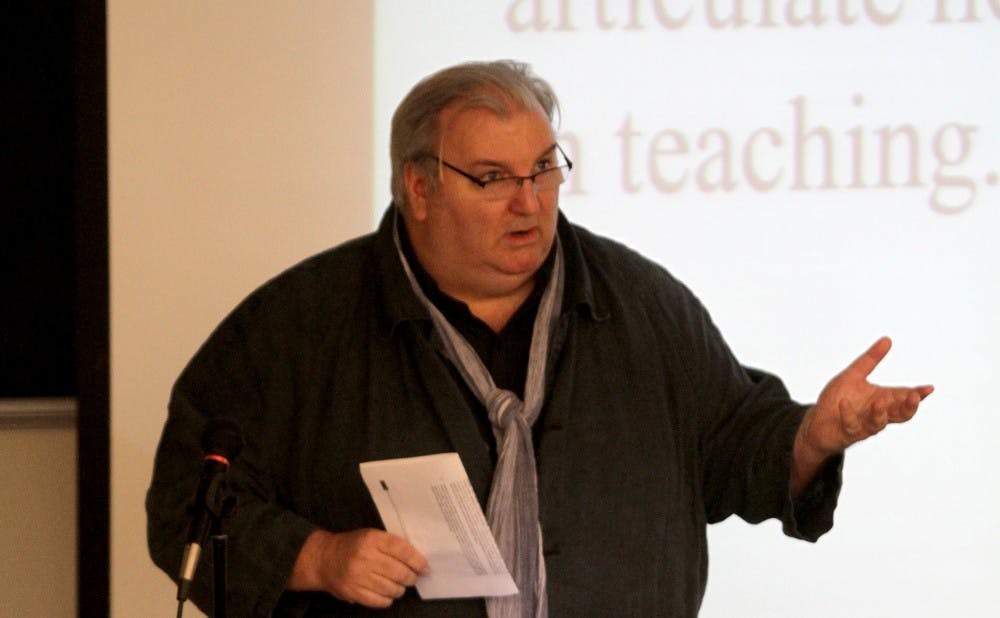The Arts and Sciences Council is considering allowing students to fulfill their graduation course requirements with credits from online courses.
If passed, the proposal would increase the number of Duke courses required for graduation from 17 to 24 out of 34 total credits. It would also allow students to take up to one online course per semester.
“The proposal gives 10 degrees of freedom they can mix and match from,” said William Seaman, a member of the executive committee of the Arts and Sciences Council and professor of visual studies. “Our students are rate busters and generally do much more than 34 courses, and thus we asked what is the minimum. The restriction is about articulating what a strong Duke education will be.”
Alison Rabil, assistance vice provost and director of financial aid, was invited to address the financial aspects of the proposal because the proposal poses questions on how to provide funding for students with financial aid.
“The answer to the question whether this will generate financial burden on students is pretty easy—no.” Rabil said. “I can’t come up with any reason why a student would be affected by this change.”
Rabil noted that the financial aid package covers eight semesters and two summer terms for a student. If students have finished all of their major requirements and decide to stay for another term, however, the financial aid office would not cover the last semester, she said.
“We are starting to figure out how to go about funding online classes, if students begin to mix and match things like doing study abroad and taking an online class,” Rabil said.
Some faculty expressed concerns over the possible effects of changing graduation requirements on current undergraduates.
The change in graduation requirements would be very taxing for advising and potential transitory issues may arise where students do not get accurate advice from advisers on what counts toward graduation and what does not, said Makeba Wilbourn, assistant professor of psychology and neuroscience.
The proposal would only go into effect for students who matriculate starting next fall, said Tyler Walters, associate professor of the practice of ballet.
Training sessions would be organized with directors of undergraduate studies on the principles of the new proposal, said Dean of Arts and Sciences Laurie Patton.
Some faculty members also raised questions on the potential impact of opening the curriculum to online courses.
“There are some reservations in the sociology department. We believe that freshmen should not be allowed to enroll in online courses here or elsewhere because first year of college typically requires a considerable amount of adjustment,” wrote Professor of Sociology Linda George in a message to Thomas Robisheaux, chair of the council and Fred W. Schaffer Professor of history. “We believe that taking a classroom-based class that encourages students to forge relationships is an essential part of the transition.”
She also noted that allowing students to take up to one online course per semester would suggest that eight online courses in total would be counted toward graduation.
“If a student takes one online course every semester, 25 percent of all the courses are taken online and we believe that is too many,” George said.
Matt Serra, director of the Office of Assessment, presented the results from a survey of first-year students on online course experience and dispositions. The survey garnered responses from 322 incoming students on their previous online learning experiences and their preferences.
The survey found that two-thirds of student participants had experience with online coursework, and the majority of students responded as willing to take online courses if they are off-campus for various reasons. Conditions under which the 322 students who responded said they would take online courses include summer breaks, internships and study abroad programs, listing convenience in scheduling as a major reason.
“The survey confirms that our students come to Duke for small classroom experiences and one-on-one interactions with faculty,” Patton said. “We don’t make technology the center of pedagogy. We are committed to thinking about online only insofar as it facilitates our learning goals.”
Get The Chronicle straight to your inbox
Signup for our weekly newsletter. Cancel at any time.

